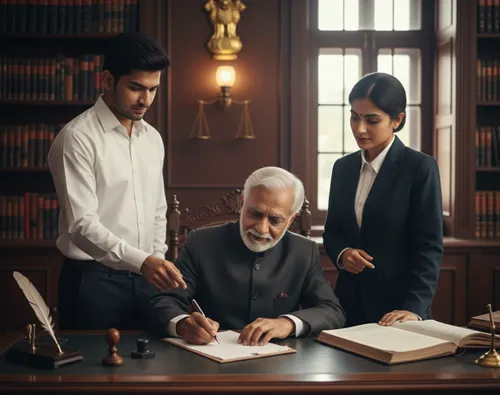
An affidavit is a written statement of facts voluntarily made and sworn before an authorised officer such as a Notary Public, Judicial Magistrate, or Oath Commissioner. It serves as proof of fact in courts, administrative offices, and private matters. The person making it (called the deponent) affirms that all information is true to their knowledge.
Submitting a false affidavit is punishable under criminal law for perjury or forging evidence.
Common Uses of Affidavits in India
| Purpose | Example |
|---|---|
| Name Change | Changing surname after marriage or correcting spelling in documents. |
| Address Proof | For government jobs, schools, or ID verification. |
| Property Matters | Ownership declaration, partition, or gift confirmation. |
| Lost Document | Declaring loss of PAN, Aadhaar, RC, or educational certificates. |
| Legal Proceedings | Supporting facts in civil or criminal cases. |
| Marriage / Income / Caste / Relationship Proof | Required in state government and central schemes. |
Steps to Make an Affidavit
- Draft the affidavit — state your personal details and true facts.
- Print it on non-judicial stamp paper (₹10–₹100 or as per state).
- Visit a Notary / Magistrate for attestation and signature.
- Affix photograph (if required).
- Keep copies for record; submit original where needed.
Documents Required to make an Affidavit
- Valid ID proof (Aadhaar, PAN, voter ID, etc.)
- Address proof (ration card, electricity bill, etc.)
- Details of facts to be declared
- Passport-size photograph (in some cases)
- Stamp paper of appropriate value
FAQs — Affidavit in India
-
1. What does 'affidavit' mean?
-
A written statement of fact sworn or affirmed before an authorised officer.
-
2. Who can make an affidavit?
-
Any adult of sound mind who understands and truthfully declares the facts.
-
3. Does an affidavit create legal obligation?
-
Yes, it's valid evidence in courts or government offices.
-
4. When is an affidavit required?
-
For name change, lost document, legal cases, address proof, or applications.
-
5. Is affidavit same as agreement?
-
No. An agreement involves two parties; an affidavit is one person's sworn statement.
-
6. Who attests affidavits?
-
Notary Public, Judicial/Executive Magistrate, or Oath Commissioner.
-
7. How much does it cost?
-
₹10–₹100 for stamp paper + ₹20–₹100 notary fee (varies by state).
-
8. Can it be on plain paper?
-
No, it must be on non-judicial stamp paper unless specifically exempted.
-
9. What should it contain?
-
Title, personal details, factual statement, declaration, date, and signature.
-
10. What if information is false?
-
Punishable under perjury laws — fine or imprisonment.
-
11. Can I write it myself?
-
Yes, but must be signed and attested by an authorised officer.
-
12. Is notarisation compulsory?
-
Yes, without it the affidavit isn't valid.
-
13. Are witnesses needed?
-
Usually no, except in property or family declarations.
-
14. Can affidavit replace original documents?
-
Sometimes accepted, but not when original is mandatory.
-
15. Are e-affidavits valid?
-
Yes, if issued through authorised online portals.
-
16. Can affidavit be used in any state?
-
Yes, but ensure stamp duty value matches that state's rule.
-
17. Does it expire?
-
No fixed expiry, but outdated facts weaken its value.
-
18. Is registration better than notarisation?
-
Not necessary unless law specifically requires registration.
-
19. Can I edit after signing?
-
No. You must draft a new affidavit.
-
20. What's the punishment for forgery?
-
Fines and imprisonment under perjury/forgery laws.
Add new comment